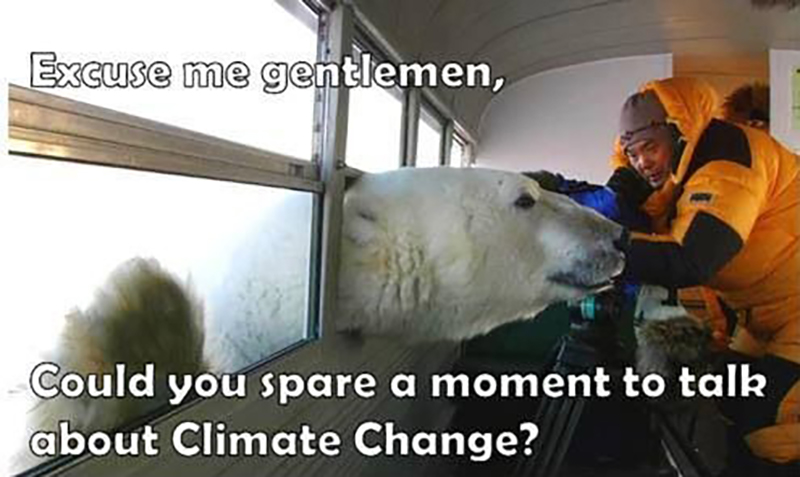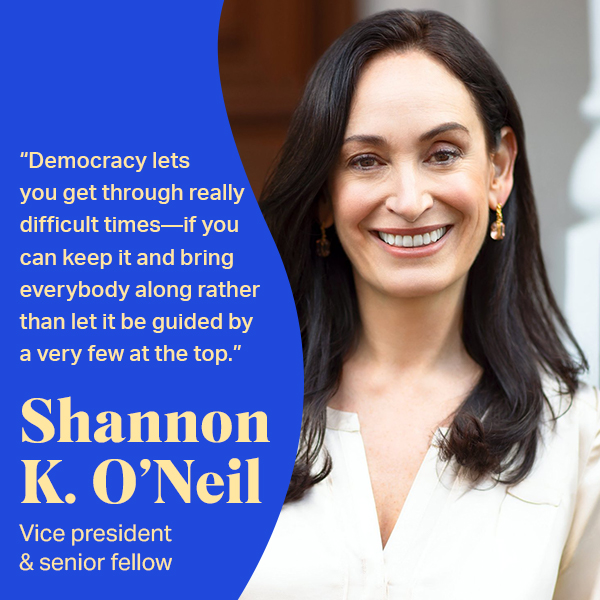Volcanoes are erupting in The Philippines, but on-fire Australia received some welcome rain. The Iran war cries have been called off and The Donald’s military powers are about to be hamstrung by the Senate. Meanwhile, his impeachment trial is starting, and we’re all on Twitter for a front-row seat.
What Could Go Right? There is no sixth mass extinction
And, outrage news takes a loss with Fox host Tucker Carlson's ouster.
This is our weekly newsletter, What Could Go Right? Sign up here to receive it in your inbox every Thursday at 6am ET. You can read past issues here.
There is no sixth mass extinction
“‘We are in the midst of a sixth mass extinction.’ Such statements,” writes Anders Bolling, “are repeated so often that they have become accepted as truth. But they are not true.”
The Progress Network teamed up with Swedish outlet Warp News, which publishes fact-based optimistic news, on this investigation into whether humans are really the perpetrators of an ongoing sixth mass extinction.
It is true that human behavior has shrunk animal populations, sometimes mightily. But we are much better now than we were, even as recently as the 1980s. We have gained not only the perspective that it is morally correct and environmentally significant to save animals, but also the tools to actually do it. We did, for example, save both the whales and the polar bears, once the protagonists of mass environmental campaigns. (There’s a reason why you still hear about climate change but not polar bears anymore.)

Numbers that point to a current mass extinction of species are frequently cited by environmental organizations like Greenpeace and featured in news headlines. They give rise to statements like Biden administration climate czar John Kerry’s remark at Davos three months ago that “half of species have already gone extinct.” Bolling traces those numbers back to theoretical models of insects and even smaller organisms that are assumed will disappear—not exactly what comes to mind, listening to Kerry. Even the insect numbers, Bolling says, are “impossible to verify.”
Read the investigation in its entirety here. It includes better numbers on how many species have truly gone extinct, examines humans’ role in that past and present, and makes the case that we can garner concern and action over the very real problem of nature preservation without overstating it.
Outrage news takes a loss
The Internet is aflutter with cable news’ “red wedding.” Tucker Carlson is out from Fox News; Don Lemon, from CNN. They are not equivalent figures, but they still left many wondering whether their exits signify the end of an era in cable news that rewarded “strident programming and personalities,” as Jim Rutenberg put it in The New York Times. I would call that era the era of outrage news. And in assessing whether it has passed, Lemon’s exit is a far more encouraging sign than Carlson’s.
Lemon’s recent comment, in reference to Republican presidential candidate Nikki Haley, that women over 40 are past their prime, a contentious interview with Republican candidate Vivek Ramaswamy, as well as a habit of anti-Trump diatribes seem to have gotten him the ax. In Lemon’s case, management has been clear that CNN is intentionally moving past outrage news. “At a time where extremes are dominating cable news,” CEO Chris Licht said in a presentation to potential ad buyers last summer, “we will seek to go a different way,” Rutenberg points out in his Times piece. He adds that the shift is backed by the chief executive of CNN’s parent company, Warner Bros. Discovery.
There has been no such signal from Fox management. At The Bulwark, Charlie Sykes hypothesizes that it was neither Carlson’s coverage nor the resultant advertiser exodus from his show, nor Dominion’s defamation lawsuit in which Carlson’s texts took center stage, nor even the ongoing lawsuit from a former booker alleging a hostile and discriminatory work environment, that spelled the end for him. It might have been the mean things he said about his bosses (that were redacted in court documents but were revealed to top brass during the Dominion case process).
We don’t know who Carlson’s replacement will be, and whether that person will double down on the outrage news method or go in a different direction. For now, it’s a blow “against the incredible malice and dishonesty of his public presence,” as conservative writer David French tweeted. And Carlson’s personal influence is sure to decline. It’s hard to imagine any news network to the left of Fox would take him—he was already fired from CNN, in 2005, and MSNBC, in 2008 —and any network to the right of it would be much smaller. Same for if he goes independent. He may still reach a sizable audience, but it’s unlikely he would reach anywhere near the three million viewers his show was pulling at its biggest.
Whatever happens next, a fact to help keep you sane: even Carlson’s massive viewership is still only about one percent of the American population. Americans, by and large, are pretty normal people who aren’t hooked on cable news. Axios also has seven steps to help ground ourselves in a toxic media and political environment, which, with or without Carlson, is not going away overnight. I love the list, particularly number five, which is “Focus on some positives”! Some of those below.
Quick hits
Nuclear now: “What’s scary is not the same as what’s dangerous.” Based on The Progress Network Member Joshua Goldstein’s book A Bright Future, the documentary Nuclear Now reveals what we’re leaving behind when we leave nuclear out of the solutions mix of the green energy transition. It also addresses common fears around nuclear energy. Nuclear Now opens tomorrow in theaters across the US. Find a theater near you.
Save the birds: One of the common protests against wind turbines is that birds fly into them. Fortunately, we have developed several systems and tools to cut down on collisions.
Reader question: Last week I wrote that changes to Uzbekistan’s criminal code, including the criminalization of domestic violence for the first time, were passed by the Uzbek Senate. One reader asked me to specify whether, in the Uzbek governmental system, further steps are needed to finalize the law. Yes, just one: Uzbek President Shavkat Mirziyoyev must sign it, which he did on April 11.
Correction: In March I wrote that Ohio and Alaska are the only US states that allow the sale of fentanyl test strips, which help prevent accidental consumption of fentanyl. This is incorrect. Thirty-six do, an addition of sixteen since January 2022, reports Axios. My apologies for the error, which came from a misreading of a report from the Cato Institute.
Below in the links section, a CO2-eating volcanic microbe, a lung-transplanting robot, a (totally different) sperm-injecting robot, and more.
Secretly Sexy: Cambodia
A pop-up section in which we celebrate numbers that represent substantial improvement in people’s lives
16: The number of children per 1000 births who die under the age of five in Cambodia, down from 124 two decades ago
99: The percent of women in Cambodia who now give birth with help from a trained healthcare provider, up from one in three women in 2000
76: Life expectancy in Cambodia, up from 42 in 1960 (including a drop to just 12 in 1975-6, during the Khmer Rouge regime)

New MRI technology from Duke University was used to image the entire mouse brain at a resolution 64 million times sharper than clinical MRIs for humans. According to Duke, “The researchers say new insights from mouse imaging will in turn lead to a better understanding of conditions in humans, such as how the brain changes with age, diet, or even with neurodegenerative diseases like Alzheimer’s.”
Challenging the Consensus on China | S4 E11

Is China the US’s perennial enemy? How do the complexities of China’s political landscape affect global affairs? And is conflict over Taiwan inevitable? In today’s episode, we explore these questions with Jessica Chen Weiss, a Cornell professor and author specializing in Chinese foreign policy and nationalism. Plus, we learn about Uzbekistan’s change in domestic violence criminality and have an update on malaria vaccinations. | Listen to the episode
Progress, Please
(Found good news? Tweet at us @progressntwrk or email.)
Other good stuff in the news
Energy & Environment:
- Old ships are getting second lives as fish housing | The Washington Post
- Volcanic microbe eats CO2 ‘astonishingly quickly’, say scientists | The Guardian
- Greener control towers are coming to an airport near you | Axios
- Germany added 35% more EV charge points in 2022 | Reuters
- Critically endangered porpoise shows signs of recovery | BirdGuides
Public Health:
- Biden administration will fund program to keep Covid vaccines free for the uninsured | The New York Times
- New mRNA vaccine hub officially launched in Cape Town | DW
- More African countries set to approve malaria shot; 20 million doses ready in 2023 | Africanews
- Spain sees the world’s first lung transplant performed entirely by robot | Euronews
Science & Tech:
- How AI can help the environment | DW
- How AI is restoring voices damaged by ALS using voice banking | The Washington Post
- The first babies conceived with a sperm-injecting robot have been born | MIT Technology Review
- Meet the new crop-dusting drones | Axios
Politics & Policy:
- EU lawmakers back ban on goods linked to deforestation | Reuters
- Colorado passes first US right to repair legislation for farmers | Reuters
- US Energy Department commits $3B to expand rooftop solar access | The Wall Street Journal
- Federal pot possession cases plummet in US | Reason
- Convictions cleared for nearly 850K Michiganders as ‘Clean Slate’ program takes effect | Michigan Advance
- Minnesota Senate passes bills for reproductive freedom and trans refuge, and ban on conversion therapy | CBS News
- Selling AR-15-style rifles is now banned in 9 states | The New York Times
TPN Member originals
(Who are our Members? Get to know them.)
- The Fox News settlement | Isaac Saul
- The Supreme Court’s abortion pill order | Isaac Saul
- What’s next for basic income? | Andrew Yang
- Rising retirement, lumps of labor, and the real migration crisis | Charles Kenny
- A crucial character trait for happiness: Don’t curb your enthusiasm | Arthur C. Brooks
- The power of American capitalism | David Brooks
- Marketing catastrophism: How climate change communication came to signify nothing | Ted Nordhaus
- Timothy Garton Ash on Europe, past and present | Yascha Mounk
- Tiny homes, GMOs, clothing, and what’s right with America | Matthew Yglesias
- What neuroscientists and philosophers understand about addiction | Maia Szalavitz
- Guns, not race, are at the root of the wave of ‘trespass’ shootings | John McWhorter
- Why Kamala Harris matters so much in 2024 | Thomas L. Friedman
- Fear not the Chinese bots | Robert Wright
- As the US and China part ways, the Global South finds its own path | Kishore Mahbubani
- Non-member add: These radically simple changes helped lawmakers actually get things done | Amanda Ripley
Department of Ideas
(A staff recommendation guaranteed to give your brain some food for thought.)
How the “Birds Aren’t Real” Conspiracy Parody Became a Compassion Movement | Cool Hunting
What the comedy project’s founder, Peter McIndoe, learned about embodying, understanding, and dealing with the fringe.
Why we picked it: I am a big fan of Birds Aren’t Real, a conspiracy parody that pretends American birds are spy robots planted by the US government. (I even bought my brother-in-law a T-shirt for Christmas.) But I wasn’t expecting any earnest or useful lessons to come out of it. I was wrong! Birds Aren’t Real founder Peter McIndoe reminds us in this TED Talk that conspiracy theorists deserve compassion as much as anybody else. —Emma Varvaloucas
New Member Alert

Shannon K. O’Neil is the Vice President of Studies and Nelson and David Rockefeller senior fellow for Latin America Studies at the Council on Foreign Relations. She is an expert on global trade, supply chains, Mexico, Latin America, and democracy. She is the author most recently of The Globalization Myth: Why Regions Matter, which chronicles the rise of three main global manufacturing and supply chain hubs and what they mean for US economic competitiveness.
Until Next Time
What’s your spirit animal?






